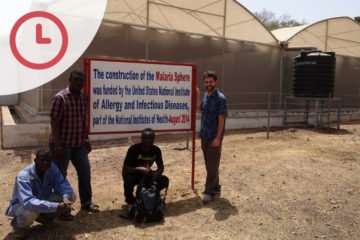Podcast Available on iTunes and Spotify.
Welcome back to Five Minutes, the podcast series where we speak to the most interesting people in the world of malaria.
Today’s episode is brought to you live from Durham University where I met with Professor Steve Lindsay to discuss his work in developing a new type of bed net.
His research has hit the headlines, with coverage from The Telegraph, The Guardian, The Express and other news sites. His mosquito net, trialled in Burkina Faso, has been dubbed as ‘revolutionary’ with the potential to save hundreds of thousands of lives.
From Durham University in the North of England, this is Five Minutes.
Professor Steve Lindsay, thanks for joining me.
Well, delighted to have the opportunity to talk to you.
How are these bed nets that you’ve produced different to the convention bed net?
So, our new nets actually have two active ingredients instead of one. So, the old nets have this insecticide called pyrethroid and the problem is that we have resistance to pyrethroids all across Africa, in the mosquitoes. So, although we’ve made huge reductions in the amount of malaria over the last 15 years in Africa, we’ve reduced the percentage of malaria cases by half, we’ve reduced clinical cases of malaria by 40%, because of the massive scale-up of these nets. At the moment we’re at a critical phase because malaria is not going down anymore, and in some places coming back. Now the reasons for this many but one of them is the mosquitoes are resistant to the insecticide. So, our new net has permethrin plus an active ingredient called pyriproxyfen, and the two together work better than a single treatment. So we showed in Burkina Faso that we got 12% greater protection within unit compared with the old one.
How much of an issue is resistance to pyrethroid?
It’s really difficult to gauge it, but we’ve seen, over the over the years, a rapid increase in resistance of mosquitoes. So you can test them by exposing them to insecticide-treated paper and where it should kill all of them, nowadays you can go to areas where 20% of them are dead, so 80% of living, breathing, flapping their wings and are absolutely fine. So that’s a real concern, and in some parts of Africa, the four insecticides that we currently have for malaria control, the vectors, the mosquitoes, are resistant to all four types. So it’s really important that we develop new active ingredients and indeed that is the case coming through onto the market.
And why did you choose Burkina Faso?
So Burkina Faso is special in two accounts. First of all, it has incredibly high levels of malaria transmission, so it’s difficult to control malaria when you’ve got so many people being bitten by infected mosquitoes. And the second is because it’s got very high resistance levels. So it’s one of the worst places in the world to go to for malaria. And so the fact that our nets worked well in Burkina Faso is encouraging for other parts of Africa as well. And although 12% reduction in malaria clinical malaria with our new nets doesn’t sound a great deal, if you were to scale that up across the whole of the country you would reduce the number of malaria cases by 700,000, which is big.
And talking more generally about mosquito nets. Do you believe that they are the most effective solution against malaria because studies have shown that less than 20% of people actually use them, it’s because they’re quite invasive then nothing but a surgical intervention which you agree with that?
Yeah, I’m not sure that I agree with that 20%. I mean that cheap cost two dollars a net family of four for five people can sleep under one.
But we’ve heard stories of mosquito nets being misused or being used for wedding dresses. What do you say to that?
Now, in many situations that occurs because they’ve got a good net over their bed and what they’re using is the old net, you know, they’ve got surplus.
Professor Steve Lindsey, thank you.
Thank you
That was Professor Steve Lindsey from Durham University on Five Minutes.


